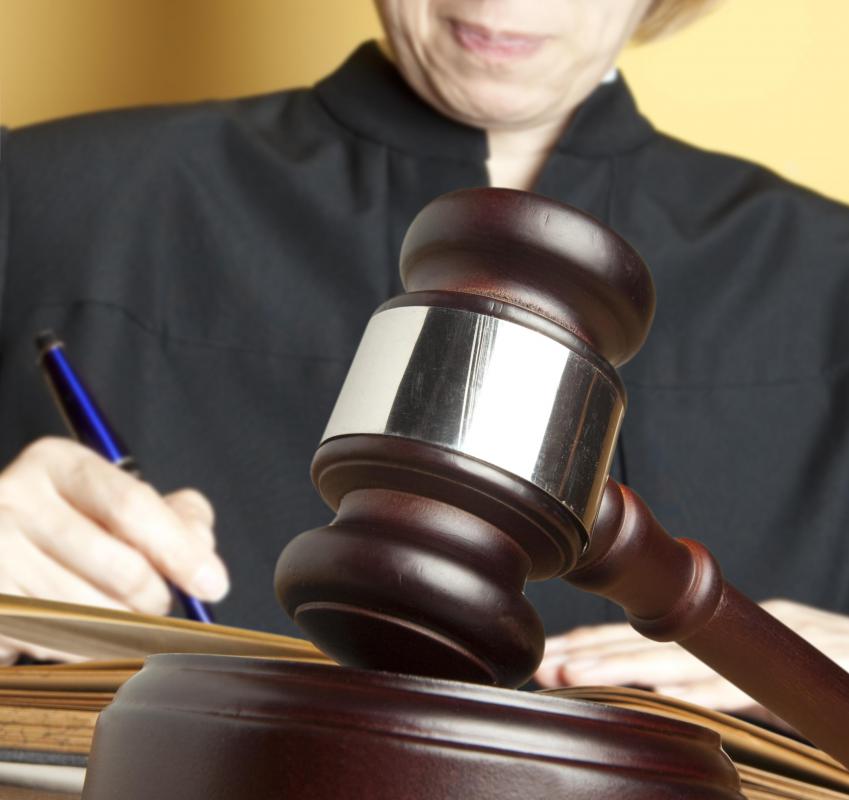At WiseGEEK, we're committed to delivering accurate, trustworthy information. Our expert-authored content is rigorously fact-checked and sourced from credible authorities. Discover how we uphold the highest standards in providing you with reliable knowledge.
What does a Judge do?
A judge is an elected or appointed official who conducts court proceedings. She must be impartial and strive to properly interpret the meaning, significance, and implications of the law. In addition, people in this job must also recognize that justice means more than just interpreting the law — they must also show compassion and understanding for those on both sides of the case.
When a case first comes to the court, the judge must decide whether there is enough evidence to support a reasonable belief that a crime has occurred and also that the person in question committed that crime. If the defendant cannot afford to hire a lawyer, the judge must appoint a lawyer to them. She also sets the bail. Once the defendant has an attorney and his or her bail amount has been set, he or she enters a plea of guilty or not guilty. The judge must ensure that the plea has been made voluntarily.

The role of a judge during a hearing depends on whether or not a jury is present. In most serious criminal cases, a jury is present and thus it is the trier of fact, meaning that they look at the evidence presented to the court and determine what actually happened and whether or not the defendant is guilty. The judge is the trier of law, meaning she ensures that everything happening in the courtroom follows the rules set down by the law. If a jury is not present in a court case, this person becomes both the trier of fact and the trier of law. This is typical for civil cases, but in criminal cases, it happens only if both the state and the defendant agree in writing to not have a jury trial; minor criminal cases, for example, are the most likely to have bench trials. Judges also determine the sentence in criminal cases and the fine amount in civil cases.

Judges have different responsibilities in juvenile cases, because juveniles cannot be charged with crimes due to their diminished responsibility. Because the court is not a criminal court, the proceedings are not adversarial and therefore the juvenile does not get a jury trial. Instead, the official listens to the evidence and arguments on both sides of the case and decides what would be best for the juvenile, the community, and the legal system.

These legal professionals are also responsible for signing warrants for arrests and searches. In common-law legal systems, such as the one used in the United States, judges have the power to punish misconduct occurring within a courtroom, to punish violations of court orders, and to enforce an order to make a person refrain from doing something. In this type of system, they can declare a law unconstitutional, as long as the reason is applicable to the case at hand. In addition, they are able to go against precedent, which provides some flexibility to interpretation of the law.
AS FEATURED ON:
AS FEATURED ON:















Discussion Comments
This is really in depth and very detailed. Great perspective.
A judge's salary is about £52,285.
what you need to put on there is the salary of a judge!
Good info!
I don't think this really described what judges do very well. You should edit this site or something!
anon6017,
"Judicial Restraint" is not the only theory of jurisprudence out there, nor is it necessarily the best....Judges ALWAYS have to make law, considering that the rulings of a case eventually come down to some subjective element such as "unconscionability." I would love to hear your argument as to the "objective" standard of unconscionability that comes from a legislator.
Once a Judge rules on this subjective matter, the ruling, whether dicta or a holding, is now free to be followed as stare decisis (by formalists), ignored (by minimalists), or interpreted by some subjective understanding of legislation MASKED as the impossible "textualism" or "referee style" theories (originalism, strict constructionism, active liberty, etc etc....)
So should a Judge completely disregard the separation of powers or legislative function? NO
But is it possible (or desirable) for a Judge to never make law...NO NO NO!!!
FS=Federalist Society
FS=For Simpletons
What a judge does not do, or perhaps more accurately, _should_ not do, is "legislate from the bench". That is, they should not make rulings that in effect create new law by setting new precedents with how the judge finds in a particular case. Their's is a more passive, rather than active role. That active lawmaking role is reserved for the legislative, not judicial, branch.
Post your comments